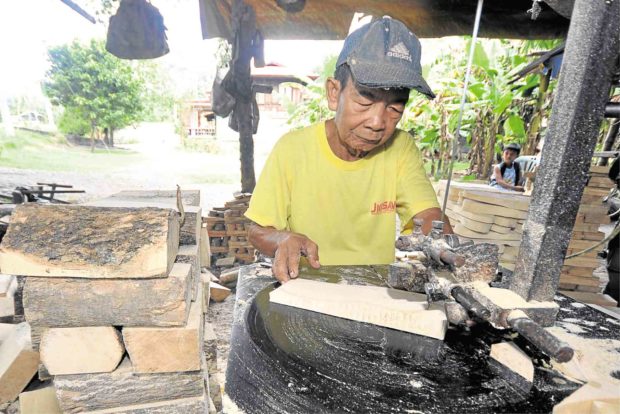Giving life to trees keeps ‘bakya’ trade from dying

Victoriano Velasco, a 76-year-old resident of Laoac town in Pangasinan province, is only one of a few remaining makers of bakya, or wooden clogs, in the town which used to have four villages engaged in the trade. —WILLIE LOMIBAO
DAGUPAN CITY — Every married couple in the farming town of Laoac has helped build a forest to save its “bakya” (wooden clogs) industry from dying.
At present, only one family manufactures bakya, a far cry from the time when four villages were engaged in the industry. The family produces 1,000 pairs a month.
The town’s “Matreemony Forest” has grown after every couple who applies for a marriage license was required to plant a tree there.
Since 2010, 400 trees have made up the small forest near a river in the village of Calmay there.
Pride
Couples used to plant a tree near their future house and another tree near the town hall.
“But we ran out of space so we decided to put up the Matreemony Forest,” Mayor Silverio Alarcio said during a media forum on Thursday.
When he visits a village, Alarcio said some residents would point to a tree with pride and declare that it was their wedding tree.
Couples getting married at the municipal hall were given gifts of wooden clogs. Trophies given by local officials were also shaped like wooden clogs to promote the dying craft.
Alarcio said he asked the town’s cobblers to continue making bakya to show visitors how these are made.
“There are now many cheap shoes and wooden clogs can’t compete. Only those living in the mountains are buying them,” he said.
The town government has also established a 2.4-hectare Tree Library in the village of Botigi where only indigenous trees are being planted. These trees include “palak-palak,” “bolala,” “sagat,” “saleng” and “oplas.”
Tree Library
“We came up with the Tree Library to preserve our local tree species, as there could come a time when children would no longer know anything about trees,” Alarcio said.
Campaigns elsewhere to preserve trees have often taken a collision course with infrastructure projects, which would require workers to cut down trees to give way to road expansion or construction of new roads.
In some areas, environmentalists have taken to driving nails into trees to destroy chainsaws that would cut these. —Yolanda Sotelo